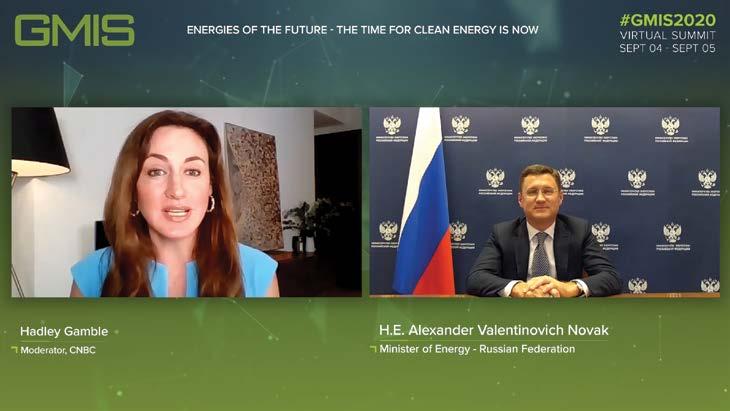
3 minute read
Fireside Chat: Energies of the Future: the Time for Clean Energy is Now
DAY ONE: Fireside Chat
H.E. SUHAIL MOHAMED FARAJ AL MAZROUEI
WATCH FULL VIDEO
H.E. SUHAIL MOHAMED FARAJ AL MAZROUEI Minister of Energy and Infrastructure, UAE
H.E. ALEXANDER VALENTINOVICH NOVAK Minister of Energy, Russian Federation
ENERGIES OF THE FUTURE:
THE TIME FOR CLEAN ENERGY IS NOW
The time for clean energy is now. That was the key message from a panel discussion on the energies of the future, with the energy ministers of major oil-exporting countries affirming their commitment to renewable energy.
The Ministers of Energy from the UAE and the Russian Federation discussed efforts to diversify their economies and shift towards a green economy. A shift that has become even more important in light of the COVID-19 pandemic.
H.E. Suhail Mohammed Faraj Al-Mazrouei, the UAE’s Minister of Energy and Infrastructure, said the country took a long-term approach to energy planning and tackling climate change, with green energy expected to provide half the country’s energy by 2050.
H.E. ALEXANDER VALENTINOVICH NOVAK
WATCH FULL VIDEO
WATCH HIGHLIGHTS



“In 2017 we looked at our options from energy sources and we looked at the targets and how we can make our cities among the world’s most liveable in the future,” said Al-Mazrouei. “And by 2050, we plan to shift from 100 per cent reliance on natural gas in 2017 to produce 50 per cent from green forms of energy.”
Solar will become the dominant contributor in the UAE energy mix with a 44 per cent share, which will cut CO2 emissions by 70 per cent and produce savings of $190 billion versus natural gas. The UAE is also the first country in the Middle East to develop nuclear power, with the first of four reactors at the Barakah nuclear power now online. Nuclear will provide 24 per cent of the country’s power when all four reactors are eventually commissioned.
“The time is now,” said H.E. Alexander Valentinovich Novak, Minister of Energy of the Russian Federation, discussing the need to reduce dependency on carbon-based energies. “The structure of our energy balance is changing. The pandemic has influenced consumer behaviour but it was already changing. Demand for oil is falling at the moment and there’s a larger portion of non-carbon sources in the energy mix. Now hydrocarbons account for 85 per cent of that mix, but it needs to reduce to 74 per cent by 2040 and we’re seeing an investment increase of 5 per cent in green and renewable energy sources compared to last year.”
Novak said Russia is making steady progress towards developing renewable energy, having launched a programme in 2014 with the target of adding 6,000MW over a 10-year period to 2024 supported by government subsidies. Currently natural gas provides just under half of Russia’s energy production, with nuclear and hydroelectric power providing almost 20 per cent each. ENERGIES OF THE FUTURE: THE TIME FOR CLEAN ENERGY IS NOW

H.E. SUHAIL MOHAMED FARAJ AL MAZROUEI
Minister of Energy and Infrastructure, UAE
H.E. ALEXANDER VALENTINOVICH NOVAK
Minister of Energy, Russia









